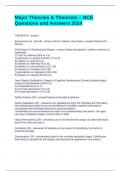Tentamen (uitwerkingen)
Major Theories & Theorists – NCE Questions and Answers 2024
- Vak
- Instelling
Major Theories & Theorists – NCE Questions and Answers 2024 THEORISTS Behavorists are...(list all) John B. Watson, Ivan Pavlov, Joseph Wolpe & B.F Skinner Previous Play Next Rewind 10 seconds Move forward 10 seconds Unmute 0:02 / 0:15 Full screen Brainpower Read More ...
[Meer zien]













